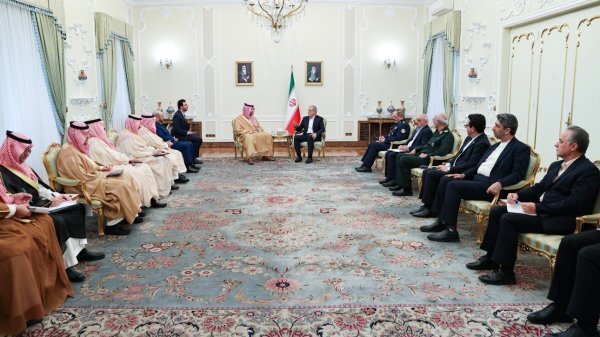Tehran-Riyadh axis against Israel’s genocide

TEHRAN - "Years ago, right where you are sitting now, your uncle, King Abdullah, was seated. I told him that we see close relations with Saudi Arabia as beneficial for ourselves. If you also see it as beneficial for yourselves, these ties can grow stronger."
These words, spoken during the recent meeting between the special envoy of the Saudi Crown Prince and the Leader of the Islamic Revolution in Tehran—where a message from Mohammed bin Salman was delivered to Ayatollah Khamenei—should be considered one of the pivotal events influencing shifts in the security order of the West Asian region. This event could mark the beginning of Riyadh’s "region-centric" approach to West Asian security.
Nearly two decades have passed since Ayatollah Khamenei addressed these words to the Saudi king—twenty years during which Riyadh chose to outsource its security umbrella to transregional powers, particularly the United States, rather than focusing on a strategy of "regional security by regional countries." Saudi Arabia’s entanglement in the quagmire of the Yemen war, along with its transformation into a low-value pawn in the eyes of Washington’s leadership—merely seen as a "suitcase of dollars"—was the consequence of the Saudi leadership’s refusal to respond positively to Tehran’s offer of friendly cooperation.
Now, however, it seems the young Saudi Crown Prince seeks a different strategy—one that paves the way for strengthening Tehran-Riyadh bilateral relations and resolving regional equations through regional actors. Mohammed bin Salman, who experienced dealings with Trump’s America (Version 1.0), has reached a strategic understanding that confrontation with Iran and escalating tensions in West Asia is Washington’s fundamental strategy against all regional states. Thus, in his special message to Iran’s Supreme Leader, he called for establishing bilateral relations at the highest levels.
According to reliable sources speaking to the Tehran Times, the Saudi government seeks to shift its engagement with Iran from a security-political framework to cultural, social, and economic approaches—a move that could herald a new security order in West Asia. Iran, too, by extending an "extra-protocol" welcome to Saudi Arabia’s defense minister, has signaled its readiness to embrace this path and strengthen bilateral ties to influence regional security.
One opportune moment for diplomatic efforts in this arena could be Donald Trump’s expected visit to Saudi Arabia in late May. This trip requires careful planning, and Riyadh’s political officials must be made aware of the consequences of any escalation in the Persian Gulf. Thursday’s meeting revealed that there are other credible channels to counter Washington’s miscalculations—channels that may prove more effective than bilateral negotiations with the U.S.
This issue gains even greater significance as Israel is currently carrying out genocide in Gaza, attempting to alter the region’s security order by erasing the Palestinian issue. The Zionist strategy not only identifies Iran as its primary enemy but also harbors deep concerns about Saudi Arabia as the holy land of Muslims. This approach has led Riyadh—despite all U.S. pressure—to explicitly express dissatisfaction with Israel’s obstruction of Tehran-Riyadh relations during its defense minister’s meeting with Iran’s Supreme Leader.
In this context, joint action by Iran and Saudi Arabia to halt Israel’s war machine and save Gaza from genocide could serve as a credible and crucial starting point for reviving bilateral relations and ushering in a new era of cooperation between the two nations.
Leave a Comment